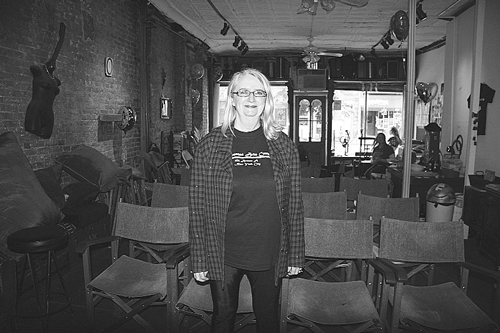By David Freedlander
Melba LaRose, executive director of NY Artists Unlimited, at Downeast Art Center on Avenue A.
The Downeast Art Center, a low-slung East Village storefront turned performing-arts space, is expected to close sometime this summer, possibly as early as the end of next month.
The building that houses the center, at 203 Avenue A, is slated to undergo major renovation at the end of June. Management of the building, which also contains 10 residential appartments, is being transferred from the city to the Lower East Side People’s Mutual Housing Association, a neighborhood nonprofit organization that rehabilitates affordable housing properties for the city. The building’s residents will be allowed to move back in after the remodeling is complete in a year’s time.
Downeast is home to and is managed by NY Artists Unlimited, a traveling theater troupe that has spent the past 24 years performing for what they call “underserved” audiences — the elderly, children and non-English speakers — usually for free or for very little cost.
The group moved into the Avenue A space in June 2004, happy to finally have a home after spending 22 years rehearsing in apartments and storing their costumes and stage props wherever they could find someone with extra space. Now faced with the prospect of being left homeless again, the group feels they were misled into taking the place to begin with.
“We never would have moved in if we thought we wouldn’t be allowed to stay,” said Melba LaRose, executive director of NY Artists Unlimited. “We put $50,000 worth of work into this place and were basically closed for six months while we redid everything. How can they now tell us we have to leave?”
LaRose claims the city promised her she would be able to buy the building after she paid for the renovation on the bottom floor, or that she would at least be able to settle in for the long term, a claim the city denies.
“We’ve been glad to rent to them but it’s always been a month-to-month lease,” said Neil Coleman, a spokesperson for the Department of Housing Preservation and Development. “They understood it wouldn’t be a long-term thing.”
When the arts group moved in, the space, located between 12th and 13th Sts., was a bodega that had recently been abandoned after the police raided it for drugs. LaRose, her husband and a few volunteers redid the floors, tore away the walls to reveal the century-old brickwork and removed the trash that had been left behind, including seven refrigerator units, one of which weighed 2 tons.
The space now hosts open mics on Tuesday, an afternoon storytelling hour for children, and, through May 14, a Bad Musicals Festival, featuring the worst in musical theater.
Lower East Side People’s Mutual Housing Association is taking over the building through the Neighborhood Redevelopment Program, which transfers city-owned properties to community-based nonprofits.
Downeast’s rent is currently subsidized by the city, a situation that will change when the building changes ownership. The leases of commercial spaces in L.E.S.P.M.H.A. properties are tied to the rent the housing association is able to charge the residential tenants who live above. The less the residents are able to pay, the more the commercial spaces get charged.
“There are very, very low-income people we are talking about,” said Mary Spink, the housing association’s executive director. “I have told [Downeast] they will get to come back; we just don’t know what the rent will be yet.”
If the rent is significantly more then the $800 that the arts center currently pays, they are not sure they will be able to afford it.
Downeast has gathered over 1,000 supporters’ signatures and is trying to garner the help of elected representatives to argue their case.
“They are trying to paint us as this horrendous organization that is trying to put them out on the street,” said Spink. “We are looking to keep local businesses in the community. The way to do things is not to come out fighting. If they had come to us we would have bent over backward to help them.”



































